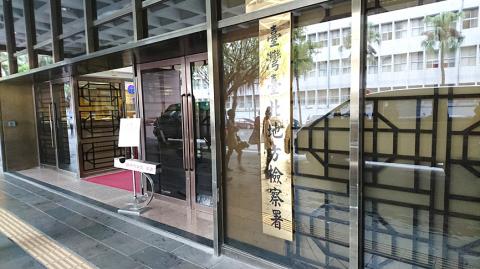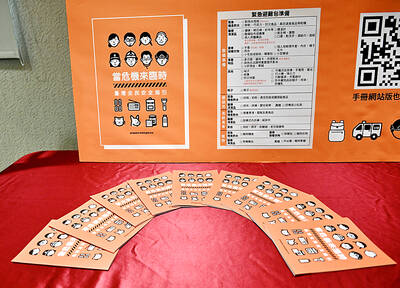The Criminal Investigation Bureau (CIB) yesterday conducted raids on five locations in Taipei and New Taipei City, detaining 10 alleged members of an operation that took advantage of a legal loophole to enable more than 10,000 “tourists” to enter Taiwan over the past three years, including Chinese government officials and spies.
Prosecutors said that it was the most serious breach of national security in the past several years.
Allegedly running the operation was Hung Ching-lin (洪慶淋), a retired journalist and former office director of the Chinese Nationalist Party’s (KMT) caucus at the then-Taipei County Council, prosecutors said, adding that the other suspects included Hung’s wife and daughter, as well as the owners and managers of New Taipei City-based travel agencies.

Photo: Huang Chieh, Taipei Times
One bureau investigator said that preliminary findings portend severe repercussions for national security, as the door was opened wide for high-level Chinese Communist Party (CCP) officials, including some from the United Front Work Department, and intelligence operatives who would otherwise be barred from visiting.
After their statements were taken, the suspects were transferred to the Taipei District Prosecutors’ Office for questioning.
They face charges of illegally profiting by aiding Chinese citizens to gain illegal entry into the nation and related offenses under the Act Governing Relations Between the People of the Taiwan Area and the Mainland Area (台灣地區與大陸地區人民關係條例), prosecutors said.
Hung registered more than 100 nonprofit organizations and shell companies with the New Taipei City Government, including the New Taipei City Water Resources Economic Development Association and the New Taipei City Industry Exchange Association, which he used to organize purportedly short-term cross-strait exchange programs for people in various professions, they said.
The loophole allowed Chinese to bypass background checks of people associated with the Chinese government, enabling them to visit Taiwan on organized “package tours,” they added.
Hung and his family colluded with about 20 travel agencies, generating revenue estimated at more than NT$10 million (US$327,815) from the collection of NT$1,000 to NT$2,000 “service fees” per Chinese “tourist,” prosecutors said.
Documents and data seized in the raids indicated that from early 2017 to June, Hung’s operation helped at least 5,000 and likely more than 10,000 Chinese enter Taiwan with documents presented to the National Immigration Agency, including invitations to fake events, exchange program proposals and bogus tour agendas, they said.
Chinese spies might have remained in Taiwan after their supposed “tours,” they added.
A preliminary assessment found that many of those Chinese would not have been permitted to visit Taiwan if proper background checks were conducted by national security authorities, bureau officials said.
Among the CCP officials and suspected operatives of Chinese intelligence agencies were Li Jiexian (李接賢) and Nien Peiguang (念培光), high-ranking United Front Work Department officials, they said.
Hung left the Chinese-language China Times to take up the office director position in the late 2000s, when he reportedly began registering the organizations.

One of two tropical depressions that formed off Taiwan yesterday morning could turn into a moderate typhoon by the weekend, the Central Weather Administration (CWA) said yesterday. Tropical Depression No. 21 formed at 8am about 1,850km off the southeast coast, CWA forecaster Lee Meng-hsuan (李孟軒) said. The weather system is expected to move northwest as it builds momentum, possibly intensifying this weekend into a typhoon, which would be called Mitag, Lee said. The radius of the storm is expected to reach almost 200km, she said. It is forecast to approach the southeast of Taiwan on Monday next week and pass through the Bashi Channel

NO CHANGE: The TRA makes clear that the US does not consider the status of Taiwan to have been determined by WWII-era documents, a former AIT deputy director said The American Institute in Taiwan’s (AIT) comments that World War-II era documents do not determine Taiwan’s political status accurately conveyed the US’ stance, the US Department of State said. An AIT spokesperson on Saturday said that a Chinese official mischaracterized World War II-era documents as stating that Taiwan was ceded to the China. The remarks from the US’ de facto embassy in Taiwan drew criticism from the Ma Ying-jeou Foundation, whose director said the comments put Taiwan in danger. The Chinese-language United Daily News yesterday reported that a US State Department spokesperson confirmed the AIT’s position. They added that the US would continue to

The number of Chinese spouses applying for dependent residency as well as long-term residency in Taiwan has decreased, the Mainland Affairs Council said yesterday, adding that the reduction of Chinese spouses staying or living in Taiwan is only one facet reflecting the general decrease in the number of people willing to get married in Taiwan. The number of Chinese spouses applying for dependent residency last year was 7,123, down by 2,931, or 29.15 percent, from the previous year. The same census showed that the number of Chinese spouses applying for long-term residency and receiving approval last year stood at 2,973, down 1,520,

EASING ANXIETY: The new guide includes a section encouraging people to discuss the threat of war with their children and teach them how to recognize disinformation The Ministry of National Defense’s All-Out Defense Mobilization Agency yesterday released its updated civil defense handbook, which defines the types of potential military aggression by an “enemy state” and self-protection tips in such scenarios. The agency has released three editions of the handbook since 2022, covering information from the preparation of go-bags to survival tips during natural disasters and war. Compared with the previous edition, released in 2023, the latest version has a clearer focus on wartime scenarios. It includes a section outlining six types of potential military threats Taiwan could face, including destruction of critical infrastructure and most undersea cables, resulting in